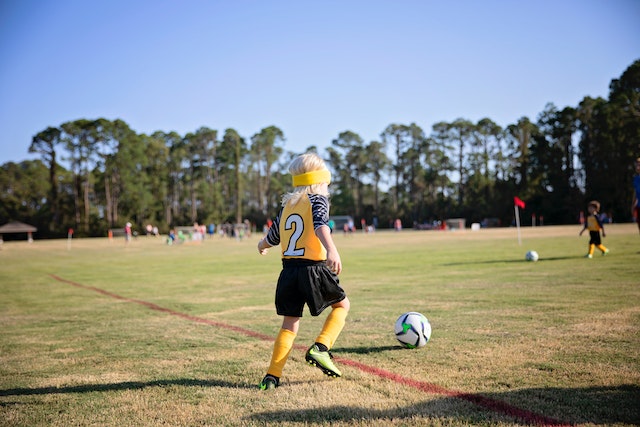In the grand playground of childhood, there’s a special place for sports. A child’s first encounter with sport can shape their relationship with physical activity, influencing their health, well-being, and even their character.

But how does one ensure that this introduction to sports is not only enjoyable but also sparks a lifelong passion? The answer lies not in pressuring your child into the most popular or medal-rich sport, but in gently guiding them towards finding a sport that resonates with their individuality, preferences, and abilities. In this article, we will delve into seven insightful and supportive strategies to help your child discover the sport they truly love and enjoy.
1. Expose Your Child to a Variety of Sports
Introduce your child to a wide array of sports, from team games like football or cricket to individual pursuits like swimming or gymnastics. This exposure will allow them to explore their interests and identify which activities they gravitate towards. Whether you are thinking of visiting that Jiu Jitsu gym down the road or even teaching them a bit of tennis in the backyard, simply giving them exposure to different sports is an excellent starting point. Moreover, this exposure to new and different sports also helps to further develop your child’s physical and mental agility.
2. Identify Your Child’s Preferences
Some children might enjoy the teamwork and camaraderie found in team sports, while others might prefer the independence and self-reliance of individual sports. Understanding your child’s preferences can guide you toward the right sport for them. Sit down with them and discuss which sports they like the most. Ask questions about the physical activities they do in school, topics discussed during their Physical Education lessons, or what type of sport their friends are into. Consider the answers you get as a starting point for your search. Furthermore, don’t forget the mental side of the equation. Ask if they prefer a sport that is more strategy-driven rather than skill-based. All of these can be key indicators in helping them find an activity that suits their personality and interests.
3. Consider Your Child’s Aptitude
Every sport requires a unique set of skills. Observe your child’s physical ability, coordination, and endurance to help pinpoint suitable sports. Are they more of a fast runner or have good ball sense? Perhaps they possess excellent coordination and balance. Consider if they are strong enough to participate in contact sports or require additional training to build their strength. This assessment will help you identify the right sport for your child, as well as any additional support they may need to take part in it successfully.
4. Provide a Comfortable Environment
Make sure the sporting environment is non-threatening and comfortable, allowing your child to focus on enjoyment without fear of judgment or criticism. A supportive environment will encourage them to persist and improve their skills. Whether they are participating in a group or an individual sport, ensure that the coach has good communication skills and is familiar with the age-specific needs of your child. Additionally, make sure that the coaching programs used for youth sports promote positive values such as respect, perseverance, and teamwork.
5. Encourage Experimentation
Allow your child the freedom to try out different sports until they find one that clicks. Encourage them to give each sport a fair chance, but also to move on if it doesn’t feel like a good fit. This experimentation should be undertaken without excessive pressure to persevere; if your child doesn’t take to a particular sport, let them know that it’s OK and that there are many other options available. It is essential to give your child the freedom to make their own choices when it comes to sports.
6. Promote Fun over Competition
The primary goal should always be enjoyment. Ensure that fun and participation are prioritized over winning, especially in the early stages. Too much emphasis on competition can lead to feelings of disappointment and even create a negative association with the sport. Encourage your child to participate in the sport for the joy of playing, rather than focusing solely on winning. This will also help teach them essential life skills such as resilience, discipline, and cooperation.
7. Be a Supportive Parent
Last but not least, be there for your child. Show interest in their activities, celebrate their efforts and progress, and provide comfort and reassurance when they face challenges. Your support will make their sporting journey all the more enjoyable and rewarding. In addition, be sure to maintain a healthy balance between supporting them and allowing them to enjoy their chosen sport without interfering too much. More importantly, make sure that participating in sports remains a positive experience for your child.
These seven strategies will help you to provide your child with the best possible introduction to sports, enabling them to discover and pursue an activity they truly enjoy. Ultimately, providing a supportive environment for your child when it comes to their sporting pursuits will go a long way in helping them find what makes them happy while also developing their physical and mental well-being. With the right guidance and support, you can help your child discover the wonders of sports. Who knows, they may even go on to represent their country one day!
Related Posts:
- How Kids Playing Sports Affects Overall Development
- Less Common Sports Your Kids Should Try
- How Kids Playing Sports Affects Overall Development
- Tips for Helping Your Kids Become More Social
- How Joining a Sports Team Can Benefit Your Child